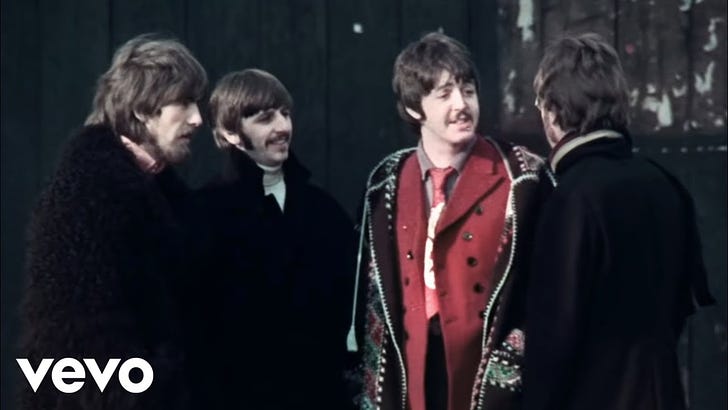On the edge of turning 80, in front of 75,000 fans recently at the MetLife Stadium in New Jersey, Paul McCartney invited Bruce Springsteen up onstage to sing “Glory Days.” Youtubers the world over have since joined in the swoon. Somehow, even though the song came out in 1984, it lassoed all the Beatles memories studding the McCartney set as well as its legacy. The sight of two senior citizens playing youth music to an adoring crowd gave rock history another shudder of wonder at how far the style has gone, and how unlikely it was to turn out like this.
To pay tribute to McCartney’s longevity, the online magazine Stereogum solicited favorite songs from 80 artists for a roundup of what makes his music so disarming, and the results proved bemusing, delicious, and downright silly. A quick scan of the material shows a skew into his lackluster solo career (with obvious choices like “Let Me Roll It” but no “Mull of Kintyre”), 60s staples like “Eleanor Rigby” and “Let It Be” and “Long and Winding Road” but not “I Want to Hold Your Hand,” “Eight Days A Week,” “Good Day Sunshine,” “Got to Get You Into My Life,” “With a Little Help From my Friends,” or “Two of Us,” for SHAME. McCartney has become famous for many reasons and very few we all agree upon; that famous Beatles consensus has splintered into a thousand new opinions.
To understand the McCartney’s musical charms, begin with his songwriting partnership with John Lennon. The collaboration both focused and confounded his own preternatural gifts. On the one hand, we think of a number like “All My Loving” as primarily a McCartney track: he sings leads all the way through, no harmonies (except minor backup “oohs”) until the final verse, when the duet turns into a full-fledged brotherly moment. Then there’s “If I Fell,” which normally gets pegged as a Lennon song, but McCartney’s upper harmony catches just the right light.
Same goes for “Don’t Let Me Down,” its late-phase cousin; the partnership spills over at least as much into vocals as it does writing. Then you have the “We Can Work It Out” McCartney, which sports a Lennon bridge, where you can hear the divide between the two even as they stitch two song ideas into one (see also “A Day in the Life” and “I’ve Got a Feeling,” both inexplicably missing). For different reasons, nobody picks “Hello Goodbye” as any kind of standout (and no votes here either), and nobody confuses “I Am the Walrus” as a “Paul” song.
This Stereogum list tilts waywardly late and solo, which proves slanted and just plain off. It does beg the question: who chose these artists? Why put Richard Thompson (”Penny Lane”) next to David Crosby (”Eleanor Rigby”)? Elvis Costello (”For No One”) next to Nancy Wilson (”Tug of War”)? Huzzahs for Nile Rodgers and Margaret Glaspy (both ”Maybe I’m Amazed”), Garbage’s Shirley Manson (”Venus and Mars” ?!?), and George Thorogood (rescuing “I’m Down”), but where’s Mr. Anti-Beatle Quincy Jones? Madonna? Lady Gaga? Angel Olsen? Tame Impala’s Kevin Parker? The Black Keys’s Dan Auerbach? Suppose we can’t fault missing names, but the list itself begs the question. Does anybody care what Jarvis Cocker thinks about anything?
Let’s turn to more granular matters. Nine tracks come off 1980’s McCartney II, trailing the White Album’s 14, which tilts the entire list out of wack: no way “Waterfalls” (mentioned three times), or “Temporary Secretary” and “Coming Up” (each mentioned twice), compete with his weakest tracks for the Beatles (there’s no “When I'm Sixty-Four” or “Maxwell’s Silver Hammer,” so kudos). This critic thinks the White Album harbors some of Lennon’s strongest Beatles material next to McCartney’s most genre-driven exercises (exceptions: “Back in the USSR,” “Birthday,” “Why Don’t We Do It in the Road?”). The White Album duds include “Rocky Raccoon,” “Mother Nature’s Son,” with “Ob-La-Di Ob-La-Da” splitting the difference. And typically, McCartney’s bass playing on “While My Guitar Gently Weeps” and “Everybody’s Got Something to Hide ‘Cept for Me and My Monkey,” and ice-hot vocals on “USSR” and “Helter Skelter” helps atone for some of the cloying. And even some of McCartney’s better genre flexes (”P.S. I Love You,” “Lady Madonna,” or “Things We Said Today”) go missing.
“Blackbird” wins with a total of 5, which feels sort of obvious, since the song has anchored his stage set since he started doing acoustic selections (1976, Wings Over America), and its status rivals “Stairway to Heaven” in the same way most insiders ban it in their guitar shops.
So even starting with what pollsters call a gigantic statistical anomaly, you still have trouble squaring choices like “Heart of the Country” (S.G. Goodman?) or “Little Lamb Dragonfly” (Def Leppard’s Joe Elliott) with some of the more obvious front-runners (”Eleanor Rigby,” “Yesterday,” “Hey Jude”). “Mull of Kintyre,” which for a long time proved his best-selling single in the UK, goes completely unnoticed, and several other buried tracks don’t appear that should: “On the Wings of a Nightingale,” a 1984 number he wrote for his mentors the Everly Brothers (for EB84); or “Six O’Clock,” on Starr’s 1974 Ringo album, which works the faintest McCartney head fake, humility.
The surprises here cut through some noise. “You Won’t See Me,” a Rubber Soul sleeper (if such an album can have “sleepers”), scores three votes from even improbable sources (Coda’s Ben Stidworthy, director John Carpenter, and Half Waif’s Nandi Rose). Turn it up on your headphones, and revel in one of the few McCartney-anchored tracks (no duets) where you can hear Lennon’s backup harmonies enhancing the whole alongside Harrison. As the energy builds with increasing waves of pleasure, this moment captures pure Beatles bliss, and always ends way too soon. The fadeout sounds almost composed, like a giant melodic creampuff evaporating into the void.
Sure, the mix of septuagenarians with millennials finds some with enough good taste to hark back to 1963 with OMD’s Andy McCluskey, who picks “Thank You Girl,” and Graham Nash, who feigns stature with “Misery”; I hear these numbers as Lennon tracks ladled McCartney good cheer (the former) and willing esprit (the latter). Extra bonus points for “Dear Boy” from Oceanator’s Elise Okusami, where Paulie sings to Linda’s ex-lover with gratitude and relief from Ram’s Cathedral of Whimsy. In a standout move that should never have proved notable, the mighty Richard Thompson picks “Penny Lane,” McCartney’s Liverpool idyll that whispers dismay. (For his “Thousand Years of Popular Music” set, Thompson turns 1963’s “It Won’t Be Long” into a tower of resentment).
Suppose you like this rabbit hole, suppose you burrow deep down to cuddle and never leave. I give you Jason Carty’s “Another 80 x Paul McCartney,” an Apple playlist that resolves many of these issues while creating new ones. In this context, I hail the appearance of “Baby’s Request,” an Elvis homage from Kisses on the Bottom, “Soily,” the 1976 encore, and “Run Devil Run,” his fearsome rock’n’roll scrimmage. One final caveat: don’t his Costello cowrites, like “Tommy’s Coming Home Again,” count for anything? Like everybody else, I completely forgot the completely forgettable “Another Day” and “Listen to What the Man Said.” Nested snugly inside this Lennon corner, I wish you your own, your VERY own, lofty opinions and snarky asides. May “Oh Woman Oh Why” soundtrack your darkest dreams.
People of pop music, I stand with Richard Thompson.
Tim Riley is the author of Beatles books Tell Me Why; Lennon: Man, Myth, Music; and, with Walter Everett, What Goes On: The Beatles, Their Music, and Their Time.




Ah, the Lennonists strike back. A plaintive cry from deep in the 1971 time warp, like Rip Van Winkle meets "How Do You Sleep." McCartney's "lackluster solo career"? Yeah right. It doesn't fly any more, Tim -- but that's clearly what's driving you bonkers. The forgettable Another Day? Oh where have I heard that one before? Please, please release Wayne from captivity.